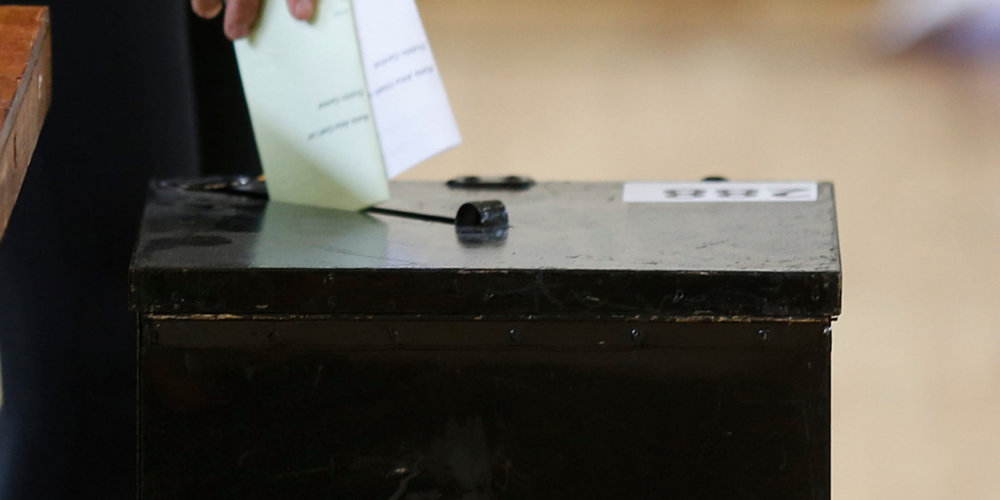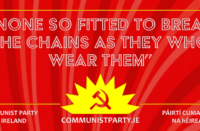In the June issue of the Socialist Voice I wrote an opinion piece intended to stimulate a debate on what I thought was the best strategy in the electoral arena, specifically looking at the upcoming General Elections in the 26 counties. That article has indeed sparked discussion and it has caused some polarisation on what the best electoral strategy might be as we approach the general election.
First off, what follows is an opinion piece intended for debate, and is not party policy. One thing that needs to be disentangled from this debate is to analyse the potential of Sinn Féin delivering a progressive left government if, in the best case scenario, it pooled together and formed a government of all left groupings and independents. Having written two previous articles on the subject I will summarise my conclusions so that there is no confusion on the matter. In the article ‘an analysis of Sinn Féin’s ascendancy in Irish politics: the cartel party model1 it is clear that Sinn Féin’s
“fundamental economic strategy does not challenge the power of the gombeen and finance capitalists. The economic base can remain intact even if the political superstructure changes for the first time in generations….Their vision of an alternative is to reform current government policy through budgetary measures rather than attempting to transform the economic base. So whether it is today, tomorrow or some day in the future, Sinn Féin… will succumb to the cartel party [model] and join FF/FG/Lab/Greens”.
In another article entitled “Is Sinn Féins vision for a united Ireland leading us down a blind alley”2, their project for a united Ireland “isn’t for creating a new Republic but for the old Republic taking over the North.. fully embracing [the] EU…It is important to point this out, because people should be under no illusion that uniting Ireland under the EU is a pro-capitalist, pro-imperialist united Ireland…Any notion that we can build and plan our economy by sovereign and democratic means under these circumstances is simply beyond the pale.”
So, it is not a question of “if” Sinn Féin will reverse or abandon principled progressive positions in its pursuit of governance, it is a question of “when”, because their vision for Ireland does not run counter to the prevailing economic base of finance and property and by extension the interests of the ruling class and the imperialist structures Ireland is bound to. I would argue that their primary objective is to bring about a united Ireland, regardless of what type of Ireland or what type of anti-people policies they have to introduce. They want to resolve the national question, without resolving the social question. We know this to be true, because this has been the harsh reality for the working class, in Sinn Féin’s practice of implementing draconian policies in the six counties.
For all the heat that has been generated surrounding this topic, there seems to be only three variations that could be adopted by the broad left, to greater or lesser degrees, and there is always the likelihood that no agreement or unity will be found, leaving ourselves more exposed. The broad left could adopt a strategy of:
1. No general backing or support for Sinn Féin,
2. Conditional support for Sinn Féin or
3. Non-conditional support for Sinn Féin.
If we bring the first variation to its conclusion, no backing of Sinn Féin, it being the last thing we should do, then we (the broad left) either adopt an abstentionist policy or only back candidates with an explicit socialist agenda and campaign manifesto. This would of course give those candidates a greater profile and chance for election, however very few constituencies will offer such candidates, so Fianna Fáil and Fine Gael would have more of an open run to maintain the governance alliance, if there is no conscious attempt to disrupt it.
The second variation, where there is conscious support for Sinn Féin, but it comes with conditions, ie it must hold an anti-NATO line or declare opposition to the EU, PESCO, or declare that it won’t go into government with Fianna Fáil, or other such conditions. You could argue that this strategy would at least hold Sinn Féin to some sort of standard and if they don’t agree to it, then they shouldn’t be considered part of the broad left, as what would differentiate them from the establishment parties in government. Many will be swayed by this reasoning, but is this type of conditionality sustainable as new or existing policies and stances would already and will inevitably contravene such conditions in the future, or is it more likely to create an atmosphere of betrayal and division, rather than unity?
The third variation, non-conditional support for Sinn Féin in the general election (not to be confused with non-conditional support for Sinn Féin in government!). What this affords is for the broad left to mount a pragmatic challenge to the political status quo, without getting itself caught up in knots everytime Sinn Féin do, or do not, release a statement or declare a position in the run up to the election. It comes with its own risks and it asks a lot, maybe too much, for some to get behind. This is what I advocated in the June article, and I still believe it to be the most cohesive electoral strategy available to the broad left, if we have any chance of a potential progressive government being formed. We don’t have any other opposition party big enough that offers us an alternative to this, and that unfortunately is the reality.
At this point it needs to be stressed that this is not to ignore the principled staunch left candidates (mostly independents) that are either currently elected or that will be running for election, they of course will be essential allies in the electoral arena and will also need the support and backing of the broad left. However, you could probably count those numbers on two hands, which is not enough on their own to mount any sort of offensive on the electoral front to form a progressive left government. What we can say is that the more of them that are elected, the greater the potential for left wing policies to be inacted and adopted into policy.
With Sinn Féin’s watershed popularity waning over the past 12 months, the establishment media will continue to try to erode it even further as the general election draws nearer. So, with this in mind our choice is to either give the coalition of FF/FG a clear run, or as good as, at maintaining political power, or maximise our unity, where in the best case scenario, Sinn Féin pool together and form a government made up of all left groupings and independents.The greater the unity of the broad left around a cohesive strategy, the less likely it would be for Sinn Féin to enter a coalition with Fianna Fáil. So in fact any cohesive stragegy, will need to avoid, as much as possible, the splintering of the broad left from a unified position. In this sense, does setting conditions, create more likely conditions for Sinn Féin to contravene them, if they have their mind set on Government?
In the wider context of political economy, we must be careful that we don’t over-emphasise the importance of the general election and this type of strategy, or electoralism in general, as the class war is fought on many fronts – ideologically, economically, culturally, socially and democratically. The level of class consciousness on the economic front, ie within the trade union movement and the social and cultural front, ie grassroots, community and cultural movements, will ultimately be revealed within the electoral front. At the current time the main opposition in Ireland, ie Sinn Féin is but the political manifestation of the level of class consciousness among the broad working class stratum. In order to change the class nature of the opposition, it must first be done in the other fronts. That means a hard ideological battle within the trade union, social and cultural movements must be fought and won, if we are to mount a challenge on the political front.
At the same time, we can’t ignore the electoral forces that are in play at the moment, whether we like them or not; in the final analysis it reveals the balance of class forces. Nor can we afford to be dismissive of elections and play a passive role to what a potential future government might look like, if we have the means and numbers to mount a challenge against the establishment parties. Right now, we have no more power to affect economic, social or political change in the entrenched sectarian 6 counties as we do in the 26 counties. Our position is defensive – defend our communities from social degradation and the blight of right wing, ultra nationalist mobilisation, defend our rights and conditions as workers, defend our social services from privatisation, defend our right to live and be afforded the chance to live and work in the communities from which we were born, without the scourge of homelessness, poverty, economic migration and social decay.
The class conscious left, in all its political manifestations, including the CPI, are electorally weak (i.e. having an ability to draft, adopt or oppose policy), and don’t feature to any significant degree to oppose the established political parties. However, there are pockets around the 32 counties that buck this trend and indeed run on, one would say, a radical left wing, socialist republican platform, but it is in the minority. What this demonstrates is that there is always a potential to deepen and broaden this radical platform to other constituencies, but as of now, for the vast majority, class relations has not come to the consciousness of the people and is merely reflected in the opposition that is mounted to the established institutions protecting the interests of the capitalist ruling class.
Therefore, the question for me does not centre on Sinn Féin, whether we can rely on or have any faith in them delivering a programme, or policies, or a government that is going to run counter to the interests of the capitalist class. That simply is not where Sinn Féin or the majority of their membership are at, so why bind them to conditions they inevitably can’t meet. The question for me is; can the working class afford another coalition government of FF/FG? Can we mount a cohesive challenge to the status quo? Can the broad left afford the continued fraction and fragmentation of its constituent parts – the trade union movement, the grassroots and community movements and the anti-capitalist left parties?
The hard, on the ground, work, of developing class consciousness and building a broad front within the economic and social/cultural forces happens outside of the electoral circus, which will be upon us soon, but we must use every opportunity to weaken the grip of capital that is strangling us now and not waste opportunities that might give us more room to maneuver in the coming years.
That is really what the original article boiled down to. It is not about putting Sinn Féin on some pedestal or pinning all our hopes on this one electoral basket. It is about mounting a strategic, coordinated and cohesive campaign by the broad left, to not only build confidence among those who believe in another world outside of the constraints of private capital if successful, but to try and bring about a concrete change to the political terrain we find ourselves in – to bring forward our defensive trenches, no matter how close or far they end up being from where we are now.






